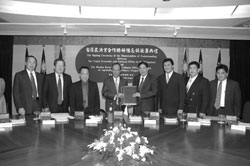News
Taipei, Manila ink farming, fishery pact
Deal, finally signed after 15 years, set to boost joint ventures
2005-10-08 / Taiwan News, Staff Reporter / By Marie Feliciano
 |
| MECO Managing Director and Resident Representative Antonio Basilio, fourth from right, and TECO Representative Wu Hsin-hsing, fourth from left , present a copy of a Memorandum of Understanding between Taiwan and the Philippines on agriculture and aquaculture. The MOU was signed in Taipei recently./ Courtesy of the Manila Economic and Cultural Office in Taipei |
Manila is banking on its groundbreaking fisheries and farming pact with Taipei to attract massive Taiwanese investors' participation in the Philippines' agriculture and aquaculture sectors, Manila's point guard in Taipei said yesterday.
"The recently signed Memorandum of Understanding on farming and fisheries will open the door to the vast array of technological accomplishments that Taiwan has in the field of agriculture and aquaculture," said Antonio Basilio, resident representative and managing director of the Manila Economic and Cultural Office in Taipei.
"This will also likely trigger joint ventures between Taiwanese and Philippine companies keen on tapping the domestic and international food markets. Demand for agricultural produce is ever-increasing."
It took Taipei and Manila nearly 15 years to finalize the pact. Basilio and his Taiwan counterpart, Wu Hsin-hsing, sealed the deal at a ceremony recently held at the Council of Agriculture in Taipei.
An 18-member team from Taiwan and a Philippine delegation led by Agriculture Undersecretary Salvador Salacup and Assistant Secretary Clayton Olalia graced the event, Basilio said.
The memorandum aims to promote scientific, technical and economic cooperation in the fields of agriculture and fisheries. The pact will facilitate regular exchanges between Taiwan and Filipino scientists, professionals and technicians; establish a mechanism to enhance institutional capabilities to comply with relevant international sanitary and phytosanitary standards; encourage joint venture investments from sea-farming and food processing to marketing technologies; and establish a mechanism to help prevent poaching activities including the speedy resolution of alleged poaching cases.
Taiwan's International Cooperation and Development Fund, the Ministry of Foreign Affairs, and the Ministry of Economic Affairs are backing joint farming and fishery programs between Taiwan and the Philippines, Basilio said.
"(This memorandum) will provide a good laboratory or testing ground for tropical agriculture," he said, adding that the pact could be the spark plug of a brand-building campaign for high-value Philippine produce.
The Philippines' potential as a food production and processing hub is barely being tapped by Taiwanese enterprises, he added.
To date, a number of small- and medium-size Taiwanese companies are involved in mushroom, tea, and even high-grade seedling production in the Philippines, the executive continued. Some have also put their money on aqua-farms. Top-end aquatic products from the Philippines, such as dried and canned abalone from Cebu, are also selling like hotcakes in Taiwan, trade promoters said.
Serious investment is still needed to enhance crop production, achieve food security, provide sufficient raw materials, and develop an effective marketing strategy for Philippine products, Basilio said.
Taiwanese companies do not only have the financial muscle needed to execute those large-scale projects, they also have a strong sales and marketing network, he noted.
"There is a lot of room for small- to large-scale joint ventures with our Taiwanese partners. Since Taiwan is rich in technical know-how, they can help us develop the capacity and capability to meet the stringent health requirements of leading export markets, and connect with buyers," Basilio said.
The outlook in the agriculture and aquaculture sectors remains positive, he continued.
"It's just beginning to take off, and it will get even bigger with the introduction of additional crop and fish varieties," said the official.
Next month, a technical working group comprising Filipino and Taiwanese officials and experts will be meeting in Manila to formulate their 2006 agenda, identify areas of cooperation, and set a timetable for such programs. Lee Jen-chyun, vice chairman of the Council of Agriculture, will be leading the Taiwan team.
"There are so many opportunities for Taiwanese food producers in the Philippines," Basilio said. "They could use the Philippines as their agriculture base."
His Taiwanese counterpart, TECO Representative Wu Hsin-hsing, said the fisheries and farming agreement was a boon to Taiwan-Philippine trade and investment ties.
"We hope that with the establishment of this platform, substantial relations between Taiwan and the Philippines will be further strengthened," Wu said at a recent MECO panel discussion.
